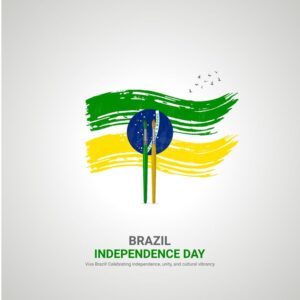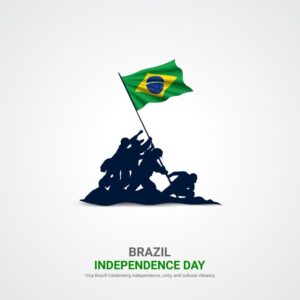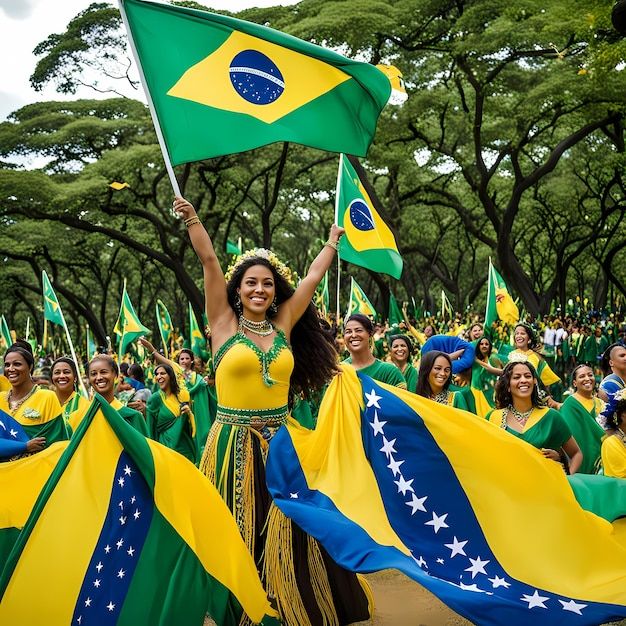🇧🇷 7 Remarkable Reasons Why Brazil’s Independence Day Sparks National Pride
🌟 Introduction: A Day That Defines Brazilian Spirit
Every country has a date etched in gold—for Brazil, that date is September 7. Known as the Independence Day of Brazil or Dia da Independência, it is a day of celebration, remembrance, and unity.
- 🌟 Introduction: A Day That Defines Brazilian Spirit
- 📜 History of Brazil’s Independence
- 📆 Timeline of Events
- 📚 7 Fascinating Facts About Brazil’s Independence Day
- ❓ Frequently Asked Questions (FAQs)
- Q1: What is Brazil’s Independence Day called in Portuguese?
- Q2: Who declared Brazil’s independence?
- Q3: Was there a war for independence?
- Q4: Is Brazil a republic or monarchy today?
- Q5: How is the day celebrated today?
- 🌎 Significance of Brazil’s Independence Day
- 🎉 Observance and Traditions
- 🕯️ Wishing Messages for Brazil’s Independence Day
- 🎯 Important Points at a Glance
- 🏠 Importance in Our Lives
- 📈 Daily Life Impact
- 📜 Inspirational Quote
- 🧠 Conclusion: Freedom with Purpose
This national holiday is more than a political milestone—it is a powerful reflection of the Brazilian people’s courage, culture, and national pride. Streets filled with parades, flags, music, and joy symbolize the moment when Brazil broke free from Portuguese rule in 1822.
Let’s dive deep into why this day matters and how it continues to inspire generations across the vibrant nation.

📜 History of Brazil’s Independence
🇵🇹 Colonial Background
Brazil was discovered by Portugal in 1500 and became a Portuguese colony.
For over three centuries, Brazil was ruled by Portugal, supplying them with gold, sugar, and other resources.
⚔️ The Napoleonic Twist
In 1808, Napoleon’s invasion of Portugal forced the Portuguese royal family to flee to Brazil.
Brazil temporarily became the seat of the Portuguese Empire, gaining more autonomy.
👑 The Key Moment – September 7, 1822
Prince Dom Pedro I, son of King João VI of Portugal, refused to return to Europe.
On September 7, 1822, by the Ipiranga River, he shouted:
“Independência ou Morte!” (Independence or Death!)This act declared Brazil’s independence from Portugal, and Dom Pedro became Emperor of Brazil.
📆 Timeline of Events
| Year | Event |
|---|---|
| 1500 | Brazil “discovered” by Portuguese explorer Pedro Álvares Cabral |
| 1808 | Portuguese royal family flees to Brazil |
| 1821 | King João VI returns to Portugal; Dom Pedro stays in Brazil |
| Sept 7, 1822 | Brazil declares independence |
| 1824 | Constitution of the Empire of Brazil established |
| 1889 | Brazil becomes a republic |
📚 7 Fascinating Facts About Brazil’s Independence Day
🇧🇷 Brazil is the only South American country that gained independence with relatively low violence compared to its neighbors.
🏛️ The first Emperor of Brazil, Dom Pedro I, was of Portuguese royal blood.
📜 The famous phrase “Independência ou Morte!” is still taught in Brazilian schools.
🥁 Military parades are central to celebrations, especially in Brasília and São Paulo.
🎶 The Brazilian national anthem was first performed in 1831, soon after independence.
🌍 Brazil’s independence inspired other Latin American revolutions.
🏞️ The Museu do Ipiranga in São Paulo houses artifacts from the independence era.
❓ Frequently Asked Questions (FAQs)
Q1: What is Brazil’s Independence Day called in Portuguese?
“Dia da Independência do Brasil”
Q2: Who declared Brazil’s independence?
Dom Pedro I on September 7, 1822.
Q3: Was there a war for independence?
Not exactly a war, but skirmishes and resistance occurred in some provinces.
Q4: Is Brazil a republic or monarchy today?
Brazil became a republic in 1889, after being an empire for over 60 years.
Q5: How is the day celebrated today?
With military parades, concerts, fireworks, flag-raising ceremonies, and cultural events.
🌎 Significance of Brazil’s Independence Day
🏛️ National Identity
Independence gave Brazil the opportunity to forge its own national identity, distinct from Portugal.
🧩 Cultural Pride
The day reflects Brazil’s diverse cultural mosaic—from Indigenous to African, European, and more.
🤝 Unity Across States
With 26 states and 1 federal district, this day unites Brazilians, regardless of regional or political differences.
🕊️ Inspiration for Sovereignty
Brazil’s relatively peaceful transition serves as a model for diplomatic resolution and self-determination.
🎉 Observance and Traditions
🇧🇷 Flag Ceremonies
Schools, government buildings, and military units raise the Brazilian flag.
The anthem is sung in chorus by children and adults alike.
🥁 Parades
Military parades in cities like Brasília, Rio de Janeiro, and Salvador showcase aircrafts, bands, and formations.
Students, scouts, and cultural groups also participate.
💃 Festivities
Concerts, food festivals, samba performances, and fireworks light up the evening.
Special TV programming and documentaries air nationwide.
🕯️ Wishing Messages for Brazil’s Independence Day
🇧🇷 “Feliz Dia da Independência! May Brazil always shine in unity and joy.”
✨ “Celebrate freedom, embrace diversity, and honor the past—Happy Independence Day!”
🎆 “On this glorious day, let’s salute the spirit of Brazil. Viva Brasil!”
🕊️ “Let peace and progress forever wave the flag of Brazil high!”
🎯 Important Points at a Glance
| Category | Details |
|---|---|
| Date | September 7 |
| Declared By | Dom Pedro I |
| First Observed | 1822 |
| National Holiday? | Yes |
| Celebrations | Parades, concerts, flag-raising, fireworks |
| Importance | Marks Brazil’s birth as a sovereign nation |
🏠 Importance in Our Lives
As Individuals
Inspires patriotism and reminds us of the value of freedom.
Encourages us to participate in civic life and contribute to society.
Promotes gratitude for democracy and peace.
In Homes
A time for family gatherings and sharing stories of Brazil’s past.
Families cook traditional meals and watch parades together.
In Schools and Institutions
Lessons on Brazil’s history, constitution, and heroes are held.
Children engage in art, drama, and cultural exhibitions.

📈 Daily Life Impact
🌿 Sparks awareness about environmental protection and cultural preservation.
📚 Drives education on constitutional rights and duties.
💼 Government uses the day to announce new civic reforms or development projects.
🛍️ Boosts the economy through shopping, tourism, and events.
📜 Inspirational Quote
“Freedom is never given; it is won.”
— A. Philip Randolph
(A fitting thought even for Brazil’s peaceful yet bold declaration of independence.)
🧠 Conclusion: Freedom with Purpose
Brazil’s Independence Day is more than historical remembrance—it is a celebration of spirit, unity, and dreams. From the battle cry at the Ipiranga River to the dazzling parades of today, it embodies a journey of a resilient nation, proud of its past and hopeful for its future.
Let us not only wave the flag, but also live the values of freedom, equality, and progress. Let’s remember that the power of independence lies not just in sovereignty—but in what we do with it.









Быстрый заказ такси https://taxi-v-sverdlovske.ru онлайн и по телефону. Подача от 5 минут, комфортные автомобили, безопасные поездки. Удобная оплата и выгодные тарифы на любые направления.